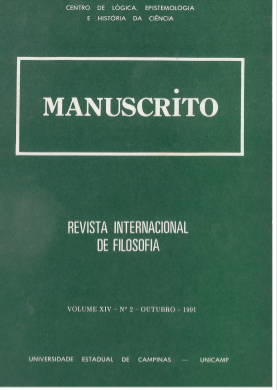Abstract
Um modelo da história das epistemes (formas de organização do mundo) ocidentais é apresentado. O modelo inspire-se na teoria dos sistemas vivos, auto-organizados, tal qual apresentada nos trabalhos de H. von Foersters, H. Atlan e outros. A história de um sistema complexo, que passou por períodos de ordem (nos quais uma episteme domina o sistema) e desordem (sem uma episteme nitidamente dominante). As vantagens do modelo são postas em evidência comparando-o com modelos alternativos existentes. Porém, uma limitação do modelo surge pela consideração do ceticismo. Este revela-se ser uma anti-episteme, uma espécie de força subversiva do sistema epistêmico, que não pode ainda ser nele integrada, apesar das várias reorganizações que nele ocorreram. As consequências de tal limitação são examinadas e sugerem-se certos rumos que a história epistémica ocidental poderá vir a tomar no futuro.
References
Atlan, H. (1979). Entre le Cristal et la Fumée. Paris: Seuil.
Bakhtin, M.M. (1987). The Dialogical Imagination. Austin: Texas: University of Texas Press.
Baudrillard, J. (1983). Tod der Moderne, Eine Diskussion.Tübingen:Konkursbuch.
Bernal, M. (1987). Black Athena, The Afrosiatic Roots of Classical Civilization. New Brunswick: Rutgers University Press.
Bohm, D. (1980). Wholeness and the Implicate Order. London: Routledge and Kegan Paul.
Boulding, K. (1978). Ecodynamics. A New Theory of Social Evolution. London: Sage.
Cantoni, R. (1977). El Pensiamento de los Primitivos. Buenos Aires: Amorrortu.
Cartieer, R. (1982). Intelectual history or sociocultural history?. In D. La Capra and S.L. Kaplan (eds.), Modern European Intelletual History Ithaca: Cornell University Press, pp. 13-46.
Cohen, E. (1988). Radical secularization and the destructuration of the universe of Knowledge in late modernity. In Eisenstadt and Silber (eds.), pp. 203-224.
De Mey, M. (1982). The Cognitive Paradigm. Dordrecht: Reidel.
Dodds, E.R. (1960). Los Griegos y lo Irracional. Madrid: Revista de Occidente.
Dupuy, J-P. (1982). Ordre et Désordres. Enquête sur um Nouveau Paradigme. Paris: Seuil.
Durkheim, e. (1954). The Elementary Forms of the Religious Life. New York: McMillan.
Eisenstadt, S.N. and I.F. Silber (eds.) (1988). Cultural Traditions and Worlds of Knowledge: Explorations in the Sociology of Knowledge. Greenwich Connecticut: Jai Press.
Von Foerster, H. (1960). On self-organizing systems and their eviroments. In Yovitz and Cameron (eds.), Self-Organizing Systems. London: Pergamon, pp. 31-50.
Foucalt, M. (1966). Les Mots et les Choses. Paris: Galimard.
Foucalt, M. (1969). L’Archéologie du Savoir. Paris:Gallimard.
Galtung, J. (1977). Structural analysis and chemical models. In Methodology and Ideology. Copenhagen: Christian Ejlers, cap.4.
Galtung, J. (1980). The True Worlds. New York:The Free Press.
Koyré, A. (1957). From the Closed World to the Infinite Universe. Baltimore: Johns Hopkins University Press.
Kuhn, T.S. (1962). The Structure of Scientific Revolutions. Chicago: The University of Chicago Press.
Lévi-Strauss, C. (1962). La Pensée Savage. Paris: Plon.
Lewis, C.I. (1929). Mind and the World Order. New York:Dover.
Lyotard, J-F. (1979). La Condition Postmoderne. Paris: Minuit.
De Martino, E. (1940). Naturalismo e Storicismo nell’Etnologia. Roma: II Sagiatore.
Maruyama, M. (1980). Mindscapes, social patterns, and future development of scientific theory types. Cybernetica 23(1): 5-25.
Morin, E. (1973). Le Paradigme Perdu: La Nature Humaine. Paris:Seuil.
Nudler, O. (1990). On conflict and metaphors: towards na extended rationality. In J. Burton (ed.), Conflicts: Human Needs. New York: St. Martin Press, pp. 177-201.
Ortony, A. (1979). Metaphor and Thought. Cambridge: Cambridge University Press.
Parsons, T. (1968). El desarollo teórico de la sociologia de la religión. In T, Parsons y otros, Sociología de la Religión y la Moral. Buenos Aires: Paidós, pp. 7-33.
Pattee, H.H. (ed.) (1973). Hierarchy Theory. New York: Braziller.
Pepper, S.C. (1942). World Hypotheses: A Study in Evidence. Berkeley: University of California Press.
Quine, W.V.O. (1960). Word and Object. Cambridge, Mass.: MIT Press.
Rescher, n. (1979). Cognitive Systematization. Oxford: Blackwell.
Rorty, R. (1979). Philosophy and the Mirror of Nature. Princeton: Pricenton University Press.
Sheldrake, R. (1981). A New Science of Life: The Hypothesis of Formative Causation. London: Blond and Briggs.
Vernant, J-P (1975). Les Origines de la Pensée Grecque. Paris: Presses Universitaires de France.
Vlastos, G. (1975). Plato’s Universe. Seattle: The University of Washington Press.
Weber, M. (1922). The Protestant Ethic and the Spirit of Capitalism. London: Routledge and Kegan Paul.
Wellmer, A. (1989). La dialéctica de modernidad-posmodernidad. In N. Casullo (ed.), Debate Modernidad-Posmoderndad. Buenos Aires: Puntosur, pp. 319-56.
Wilber, K. (ed.) (1982). The Holographic Paradigm and Other Paradoxes. Boulder and London: Shambala.
Winch, P. (1958). The idea of a Social Science. London: Routledge and Kegan Paul.
Wittgenstein, L. (1969). On Certainty. New York: Harper and Row.

This work is licensed under a Creative Commons Attribution 4.0 International License.
Copyright (c) 1991 Manuscrito: Revista Internacional de Filosofia

